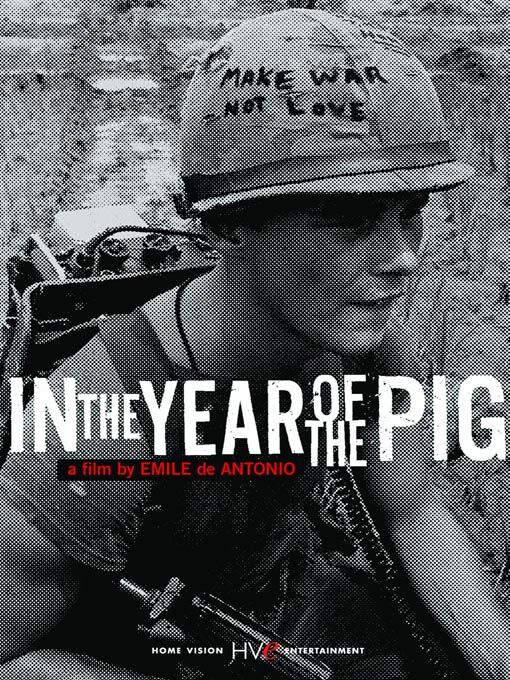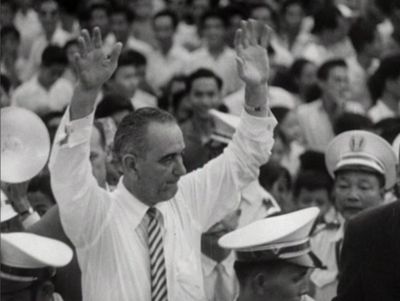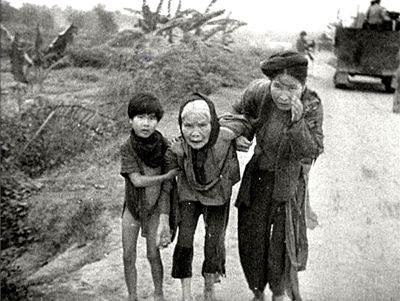In
the Year of the Pig
1968
Director: Emile de Antonio
Starring: the politicians, soldiers,
and Vietnamese of the sixties
I
was not alive for the Vietnam War, but my parents were. More than that, my father was of draft-able
age during the Vietnam War. I did not
live through these years myself, but my parents have talked at length about
what it was like for them in the late sixties and early seventies. And yet, despite these discussions and two
years of US History classes in high school, the Vietnam War still remains a
political quagmire to me, full of unclear intentions. It’s very easy for me to understand why the
US was split in terms of supporting and protesting this war, but understanding
the war itself is much more complicated.
This
documentary uses footage from various sources – newsreels, shot footage,
photographs, interviews – along with audio of interviews from mainly Western
politicians to track through the history of conflict in Vietnam in the fifties
and sixties. de Antonio starts with an
examination of French involvement in Indochina and from there, discusses how
the various factions came to power in Vietnam and how the US came to be
involved.
In
the Year of the Pig
is a very powerful anti-war documentary, but its potency is increased because
of when it was made – 1968 – and how it was made. de Antonio was ballsy enough to make this
during the war, not after. The Vietnam
War would still persist for several more years.
This was an ongoing war when this film was released. The subject material is not being treated
with 20/20 vision of history looking back on what has happened, this is what
WAS happening. There is an immediacy,
therefore, to In the Year of the Pig that all other films about the Vietnam
War, even the narrative films, lack. Outcome was uncertain. Everything was uncertain.
The
style of the documentary works as well.
What makes the film powerful is the hands-off approach by the
filmmakers. I tend to find that
documentaries where we never see or hear the filmmakers more effective. Perhaps that’s simply a personal preference,
and I’m certainly no expert on documentaries, but messages tend to be stronger
if an audience can discover them for themselves rather than have them spoon-fed
down their throat. But de Antonio’s hand
is all over the film despite his visual and audio absence. He is clever, very clever, with the
editing. For example, he takes an
interview conducted with a nuclear officer on a destroyer who says that their
ship was never attacked by enemy torpedoes and splices it together with a press
conference by a politician who rails about how said ship WAS attacked by
torpedoes. Not much later, we hear a
politician make a statement that the prisoners the US have taken are being
treated fairly while we watch footage of a Vietnamese man being beaten by US
soldiers.
This
sort of careful and deliberate editing is hardly objective, and that’s the
point. This is an incredibly subjective
documentary that does not attempt to present both sides of the issue fairly and
without comment. Oh no, de Antonio is
commenting most vociferously (all from offscreen, of course) in order to combat
what he presents as equally subjective messages coming from the US
politicians. It’s as if de Antonio is
showing us the “other side” of the story, the one the government “doesn’t want
you to see.” At the very least,
regardless of your personal feelings about politics, de Antonio should make you
question the veracity of the message that came out of the politicians’
mouths. He makes a decently strong point
about the disconnect between what was said back in America and what was
happening on the ground in Vietnam.
A
poetic and rather sad speech by a member of the clergy who had visited Vietnam
on several occasions is part of what closes the film. It’s a plaintive cry for peace. This is intercut with journalists describing,
a bit coldly but heck, they’re journalists, the power they had witnessed of the
North Vietnamese. Although de Antonio
certainly didn’t know exactly how the Vietnam War would end, the end of the
film has a frightening sort of foresight, one that seems to suggest at what
would eventually happen.
If
anything, In the Year of the Pig, although not the most gripping film
ever made, is a way to attempt to immerse oneself in the era in which it was made. By watching a product of the sixties about
the seminal event from the sixties, we have, in essence, an important
historical artifact. Just as watching
all the films from the 1930s that deal with the Great Depression in some way
helped me to understand the implications of that event in a way no history
class ever could, In the Year of the Pig gives me an artistic way to experience
the incredibly muddied politics of the Vietnam War.
Arbitrary
Rating: 7.5/10


